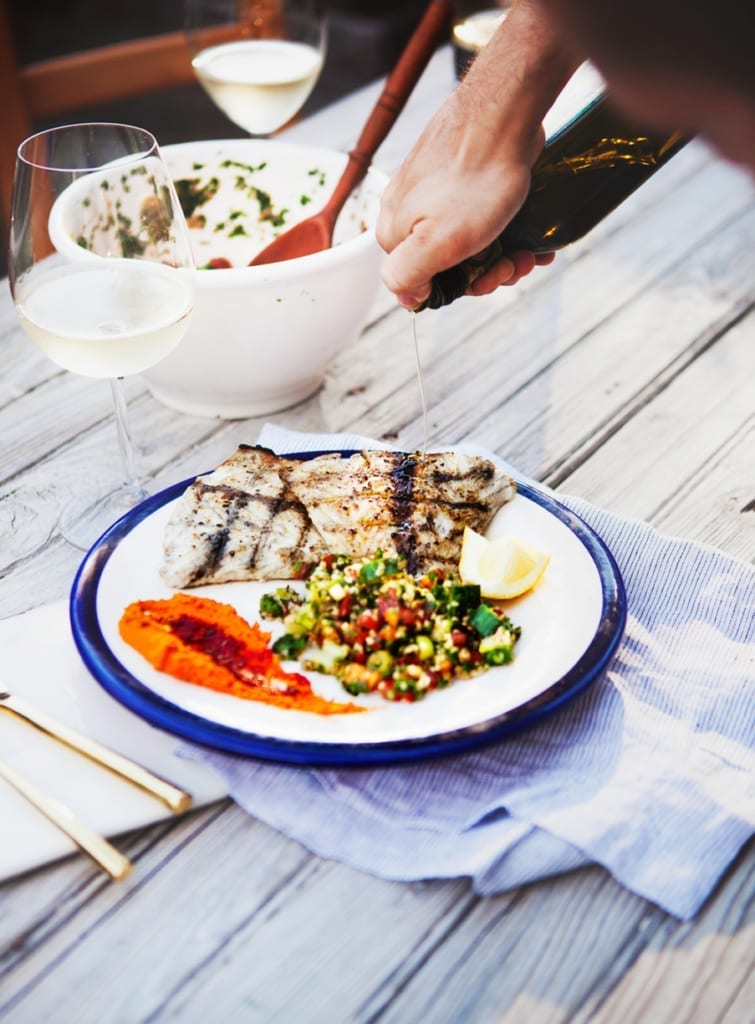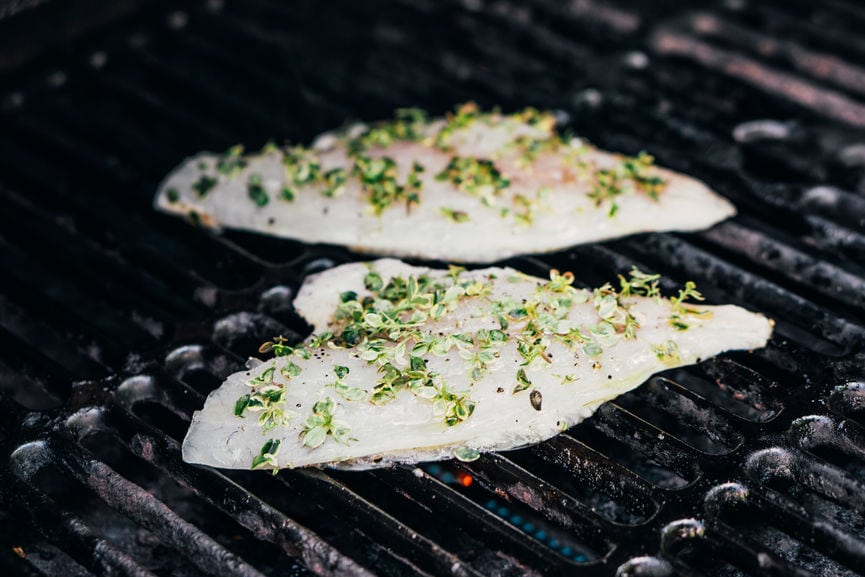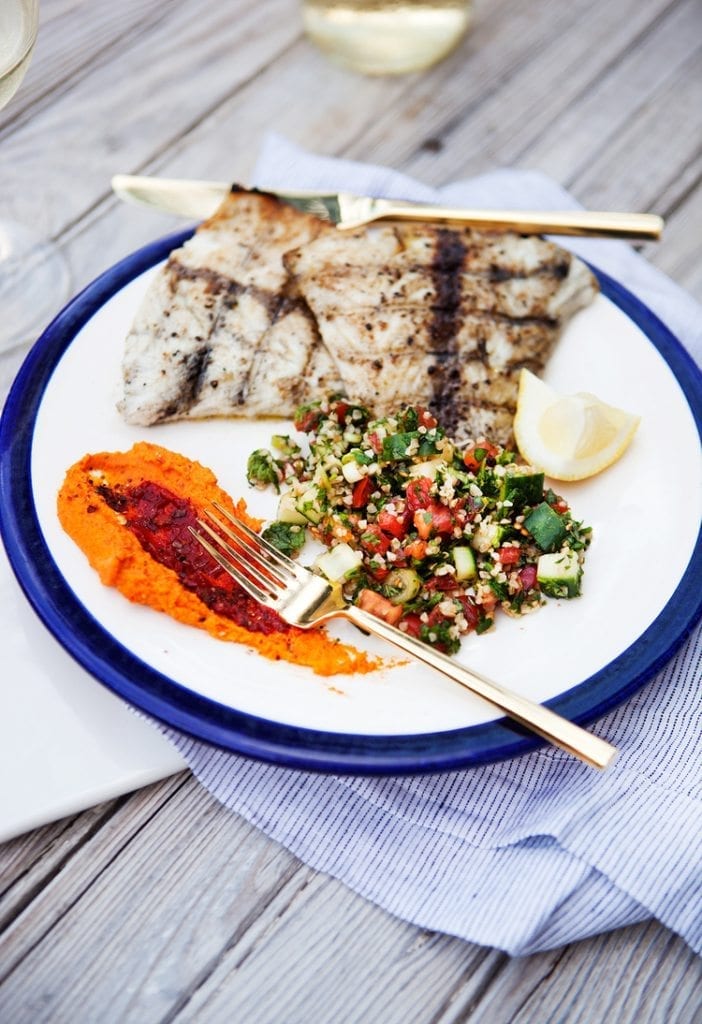How to Avoid 3 Common Fish-Grilling Disasters

If you’ve ever pulled a fish from the grill too soon only to have it stick, tear, and flake apart, then you know that grilling fish can be an intimidating endeavor. But it doesn’t need to be.
When fish cooks over open flame, it loses moisture fast, more so than other types of meat. The secret to grilling success is balancing heat, oil, and timing.
While we’re in the thick of the summer months, there’s no better time to perfect the art of grilling fish. You’ll be glad that you did. Here are the top three disasters that you might encounter when grilling fish, the underlying problem(s), and how to overcome them.
1. “My fish is sticking to the grill.”
Your fish is likely sticking to the grill for one or more of these reasons:
- Your grill isn’t clean enough: Burned-on debris from previous grilling sessions creates a rough surface that fish will stick to.
- Your grill isn’t hot enough: When it is, it will quickly cauterize the fish, which sets the proteins in the fish and prevents them from sticking to the grill.
- Your fish isn’t done cooking: When it is, it will pull away cleanly from the grill on its own.
Master Good Grill Hygiene
Make sure to start with a clean grill. Once the fire is ready, you’ll need to prep the grilling surface for the fish. The first step is to clean the grill grate well with a non-metal grill brush. Then using a long pair of tongs, rub the grate with a cloth or paper towel coated with vegetable oil. You should see a slight shimmer on the grate from the oil.
You can do this grill cleaning routine as you’re getting ready to cook your fish or consider doing it as part of your clean up so that the grill is ready to go the next time you decide to fire it up.
Turn the Heat Up
Once the heat is on, Food Republic recommends putting the lid on the grill and stepping away for a little while to allow time for the heat to build. You want a very hot grate!
Be Patient With Your Fish
When you’re ready to grill the fish, place the skin-side down first directly over the hottest part of the grate. Let it cook in peace. Do not disturb it for a good 4 to 5 minutes. To test its done-ness, gently lift a corner of the fish with a metal spatula. If it does not lift cleanly from the grill, the fish is telling you that it’s not ready. Continue to let it cook, checking it every half minute until it releases easily from the grill. Flip the fish and let it cook for a few minutes on the other side until a thermometer reads 145˚F when inserted in the center of the fish. (In general, you can expect 8-10 minutes of total cooking time per inch of fish.)

2. “My fish is falling apart.”
Fish that falls apart on the grill is likely indicative of two things:
- You chose a species of fish or cut that isn’t suitable for grilling, such as more delicately textured fish and thin fillets.
- You didn’t leave it alone and let it do its thing. Too much poking and prodding will cause the fish to break down and, well, fall apart.
Choose Your Fish Wisely
Although there are no hard-and-fast rules about which fish species are best to grill, thicker (one-inch) cuts of firm-flesh fish such as salmon, tuna, and barramundi (with the skin if possible) tend to be ideal for grilling. The key is to wrap the thinner fillets in aluminum foil.
As always, when making your selection, make sure the fish is unblemished, the flesh firm, and the smell sea-breeze fresh. Also, check Seafood Watch to make sure you’re making a sustainable choice. Buy or thaw your fish the same day you plan to grill it and always keep in cold until just before grilling.
Let Your Fish Be
While your fish is cooking on each side, resist the urge to poke and prod it. Leave it alone until it’s done cooking, then flip or remove from the grill. In general, fish should take 3 to 5 minutes per side to cook depending on the thickness of the fish.

3. “My fish is overcooked.”
Overcooked fish is a sad result of cooking the fish for too long or not sealing in the moisture with a coat of oil before cooking.
Avoid overcooking your fish with an adequately hot grill, making sure your fish is nice and dry, and some oil.
Get the Grill Hot
The key to tender grilled fish is starting with a hot fire. This will lessen the amount of time the fish will cook overall, thereby preventing the meat from getting too tough. It will also help caramelize the fish and allow grill marks to form (a must for that perfectly-grilled fish look). A hot fire will help prevent the dreaded grate-sticking, too (as noted in No. 1).
Brush the Fish with Oil
To help seal in some of the natural moisture, pat the fish dry and coat it with vegetable or olive oil. This is particularly important for firm-fleshed fish like salmon, halibut, or tuna, which can go directly on to the grate. Sprinkle with salt and pepper, or other seasonings as desired.
If grilling fish that are in thinner fillets, lightly oil both sides of the fish, and place on aluminum foil, which will act as a buffer between the grill grate and the fish.
Check out our How-To Video on How to Grill Fish Like a Pro:
Need some grilling inspiration? Check these recipes from the Australis Kitchen: Grilled Barramundi with Radish Top Pesto, Cumin Grilled Barramundi with Harissa Spiced Hummus and Tabbouleh